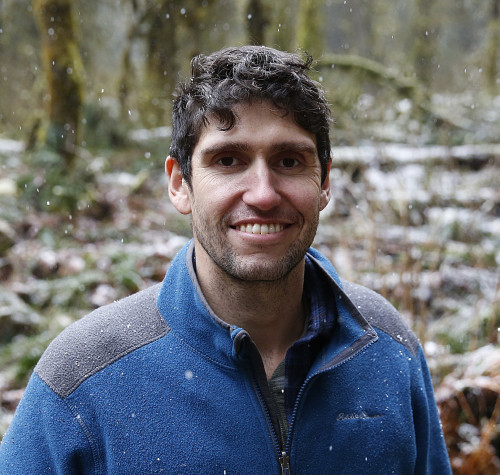Author Ben Goldfarb to visit UW–Madison as fall Science Writer in Residence
Ben Goldfarb, environmental journalist and author of acclaimed books about beavers and the way roads have carved up wild places, is the University of Wisconsin–Madison’s Sharon Dunwoody Science Journalist in Residence this fall.
From Oct. 17 to 19, Goldfarb will visit campus, joining classrooms to share his science journalism expertise with students in English, journalism and ecology courses as well as speak about his reporting experiences and what he’s learned about ecology during the Wisconsin Science Festival.
The event, free and open to the public, will take place Oct. 18 from 5 to 6:30 p.m. in the DeLuca Forum at the Discovery Building, 330 North Orchard St. A livestream link will be available at go.wisc.edu/bengoldfarb by the time of the event.

Ben Goldfarb is an environmental journalist and acclaimed ecology author. He will be visiting UW–Madison as the fall Science Journalist in Residence.
For more than a decade, Goldfarb has written about environmental topics like disappearing animal species, timber poachers and illicit ocean fishing for outlets including National Geographic, The New York Times, High Country News and The Atlantic.
Goldfarb’s 2019 book, “Eager: The Surprising, Secret Life of Beavers and Why They Matter” described how humans pushed beavers out of their role as primary animal engineers of the natural landscape of North America and Europe, as well as the scientists, ranchers and other “beaver believers” promoting the beavers’ ability to create and maintain important wetlands and dwindling habitat to the benefit of people and threatened animals.
“Eager” won the 2019 PEN/E.O. Wilson Literary Science Writing Award and landed on lists of top nonfiction and science books from The Washington Post, Science News and Booklist.
In September, Goldfarb published his most recent book, “Crossings: How Road Ecology Is Shaping the Future of Our Planet,” another well-received exploration of human impacts on the world — more directly, in this case, affecting wide-ranging shifts in wild ecosystems with relatively thin ribbons of pavement.
A graduate of Yale University’s master’s program in environmental management, Goldfarb followed the roads, the animals whose lives are penned in by asphalt, and the people trying to the ameliorate the damage across Brazil, Canada, England, the United States and elsewhere. The book has garnered glowing reviews in the likes of the New York Review of Books, Wall Street Journal and Science.
Goldfarb is also an accomplished fiction writer.
The UW–Madison Science Journalist in Residence program was founded in 1986 and is hosted by the School of Journalism and Mass Communication and University Communications. It is now part of the Sharon Dunwoody Journalist in Residence program at UW–Madison. The late Dunwoody, a professor of journalism at UW–Madison, co-founded the Science Journalist in Residence program with Terry Devitt, emeritus director of research communications.
The program has hosted national science writers nearly every semester, in-person and virtually, including Sabrina Imbler of Defector, Radiolab’s Latif Nasser, Scientific American’s editor in chief Laura Helmuth, biologist-turned-science journalist Michelle Nijhuis and Pulitzer Prize-winning Atlantic reporter Ed Yong.
Tags: journalism, science




